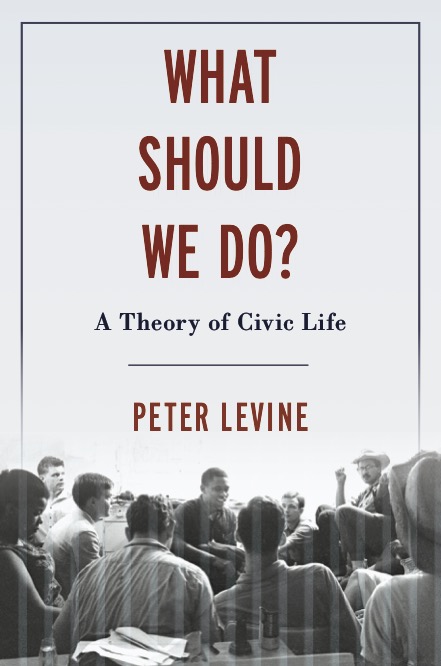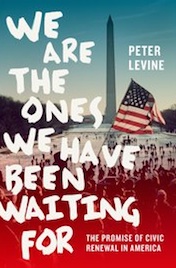Civic Activities
The civil society of the United States is in turmoil, and institutions increasingly fail to engage people or to embody basic democratic principles. “Civic renewal” means addressing both sides of the equation: citizens’ disengagement and institutional corruption. It requires the skills and strategies that are reflected in this “learning map”:
I have tried to contribute through my practical work with organizations like CIRCLE, The Center for Information and Research on Civic Learning and Engagement, of which I was a founder and later the director; the Tisch College of Citizenship and its community partners in Medford, Somerville, and Boston; and the organizations on whose boards I have served: AmericaSpeaks, Street Law, the Newspaper Association of America Foundation, the Campaign for the Civic Mission of Schools, the Kettering Foundation, the American Bar Association Committee’s for Public Education, and Everyday Democracy.
I have also published on these topics:
Books on Civic Theory and Practice
Levine, Peter. (2022). What Should We Do? A Theory of Civic Life. Oxford University Press. ISBN: 9780197570494
People who want to improve the world must ask the fundamental civic question: “What should we do?” Although the specific issues and challenges people face are enormously diverse, they often encounter problems of collective action (how to get many individuals to act in concert), of discourse (how to talk and think productively about contentious matters), and of exclusion. To get things done, they must form or join and sustain functional groups, and through them, develop skills and virtues that help them to be effective and responsible civic actors.
In What Should We Do?, Peter Levine, one of America’s leading scholars and practitioners of civic engagement, identifies the general challenges that confront people who ask the citizens’ question and explores solutions. Ultimately, his goal is to provide a unified theoretical foundation for effective civic engagement and citizen action. Levine draws from three rich traditions: research on collective action by Elinor Ostrom and her colleagues, work on deliberation and discourse by Jürgen Habermas, and the nonviolent social movements led by Gandhi and Martin Luther King, Jr. Using real-world examples, he develops a theory of citizen action that can effectively wrestle with these problems so that they don’t destabilize movements.
A broad theory of civic life, What Should We Do? turns from the question of what makes a society just to the question of how to relate to our fellow human beings in a context of injustice. And it offers pragmatic guidance for people who seek to improve the world.
- “Peter Levine is among the leading philosophers of civic life of his generation. What Should We Do? is his magnum opus. It ranges widely from a masterly review of political philosophy to practical suggestions for addressing issues like the Black Lives Matter movement. For anyone concerned about the state of our democracy and what our role should be, this book is must reading.” — Robert D. Putnam, Research Professor of Public Policy, Harvard Kennedy School, and coauthor of The Upswing: How America Came Together a Century Ago and How We Can Do It Again
- “What Should We Do? offers a compelling, thought-provoking, and urgently-needed framework for anyone trying to understand how we can relate to and act with each other to co-create a more just world. I love this book and you will too.” — Hahrie Han, Stavros Niarchos Foundation Agora Institute Professor of Political Science, Johns Hopkins University
- “Peter Levine makes everyone think more clearly about everything. How fortunate for our country that he’s applied this gift to the realm of civic life. In this insightful and wise book, Levine reveals what it truly means to cooperate, deliberate, and activate—and challenges us to do all three more mindfully.” — Eric Liu, CEO of Citizen University, and author Become America
We Are the Ones We Have Been Waiting For: The Promise of Civic Renewal in America (Oxford University Press, 2013)
“As America has wallowed through an unprecedented decline in civic engagement, Peter Levine has been a lighthouse warning of the dangers of civic alienation. Now, he makes the encouraging case that although we will live for a while with the consequences of past mistakes, the worst of the storm is over. Professor Levine concludes with ten common sense strategies that can energize the people and their governmental institutions while preparing a new generation of Americans with the values and competencies to sustain our reinvigorated democracy.”
–Bob Graham, United States Senator (1986-2004)“Peter Levine is a remarkable asset–a scholar whose research is rigorous and unflinching but whose passion for democracy brims with optimism and engagement. In We Are the Ones We’ve Been Waiting For, Levine catalogues all the ways our institutional systems discourage engagement among citizens. But he finds and lifts up a million people doing civic work for a better world, and asks us to join and harness that energy for real change. It’s clear-eyed and a clarion call–and a must read whether you’re a full time advocate or ‘just’ a citizen hoping to make a difference.”
–Miles Rapoport, President, Demos“We know what it means to get better leaders. But how are we supposed to produce better citizens? That’s the question Peter Levine brings into focus. If the examples he describes can spur the one million most active citizens into a movement for civic renewal, we will all benefit from communities that are more deliberative, more collaborative, and more engaged.”–Alberto Ibargüen, President and CEO, the John S. and James L. Knight Foundation
“In an America now rife with inequality, institutionalized corruption, a jobless recovery and more prisoners than any other country, many sense that we stand at a nadir of democracy. With inspiring erudition, Levine points to an unlikely solution: the people themselves. Drawing from experiences in schools from Washington, D.C. to neighborhoods in San Antonio, he develops a pragmatic approach to civic revitalization that builds upon developments in organizing, deliberation, civic education, and public service, but goes far beyond any of these to reach for an ambitious vision of participatory democracy. He asks us to join the emerging civic movement he describes, and we all should.”
–Archon Fung, Ford Foundation Professor of Citizenship and Democracy, Harvard Kennedy School
The New Progressive Era: Toward a Fair and Deliberative Democracy (Rowman & Littlefield, 2000)
“Peter Levine’s new book represents an important new voice in our national deliberations about how to revitalize American democracy. It is a thorough, thoughtful account of the contemporary relevance of the ideas and innovations of the Progressive Era and a persuasive case for a new progressive agenda in American politics.”– Prof. Robert D. Putnam, Harvard University
“Some books you read and put aside. Others you send to friends; this is one of those books. Peter Levine brings a rich historical and philosophical perspective to an immediate and practical question: What is going to be the effect of all the effort that has gone into civic renewal in the last decade? What it will take to make democracy work as it should will be an especially pressing issue in the 2000 elections. Americans are already frustrated by a political system where money, rather than people, seems to do the voting. This book speaks to everyone from journalists to foundation executives to teachers to members of civic organizations–all citizens. Don’t miss reading it.”
— David Mathews, President, Kettering Foundation
(With John Gastil), The Deliberative Democracy Handbook: Strategies for Effective Civic Engagement in the Twenty-First Century (Jossey-Bass, 2005)
Selected Articles on Civic Renewal
- “Does the Civic Renewal Movement Have a Future?” The Hastings Center Report, vol. 51, Issue S1 (2021), pp. S10-S14
- “Why Protect Civil Liberties during a Pandemic?” Journal of Public Health Policy, vol. 42, no. 1, pp. 154-159
- “Theorizing Democracy in a Pandemic,” Democratic Theory, vol. 7, issue 2 (2020), pp. 134–142.
- “The Complexity of Civic Life,” The Bridge (the quarterly of the National Academy of Engineering), vol. 50, no. 4 (Winter 2020), pp. 34-6
- “Citizens against Domination: A Critical Reading of Ian Shapiro,” The Good Society, vol. 28, No. 1-2 (2019), pp. 1-8.
- “Putting the US Constitution in Its Place,” in Citizenship and Civic Leadership in America, edited by Carol McNamara and Trevor Shelly (Lanham, MD: Lexington Books, 2022), pp. 281-292.
- (with Tetyana Kloubert) “Politische Bildung in den USA,” in Wolfgang Sander and Kerstin Pohl (eds.), Handbuch politische Bildung (Frankfurt: Wochenshau, 2022)
- “’What Should We Do?’ The Bloomington School and the Citizen’s Core Question,” in Ostrom’s Tensions: Reexamining the Political Economy and Public Policy of Elinor C. Ostrom, eds. Roberta Q. Herzberg, Paul Dragos Aligica, and Peter J. Boettke. Arlington, VA: Mercatus Center at George Mason University, 2019.
- Peter Levine and Kei Kawashima-Ginsberg, “Preparing for Civic Life.” In Rafael Heller, Rebecca E.,Wolfe & Adria Steinberg (eds)., Rethinking Readiness: Deeper Learning for College, Work, and Life (Cambridge: Harvard Education Press, 2017), pp. 59-79
- Peter Levine & Kei Kawashima-Ginsberg, “State Policies for Civic Education,” in Esther Thorson, Mitchell S. McKinney, and Dhavan Shah, eds., Political Socialization in a Media-Saturated World (New York: Peter Lang, 2016), pp. 113-24.
- “Democracy in the Digital Age,” The Civic Media Reader, edited by Eric Gordon and Paul Mihailidis (Cambridge, MA: MIT Press, 2016), pp. 29-47.

